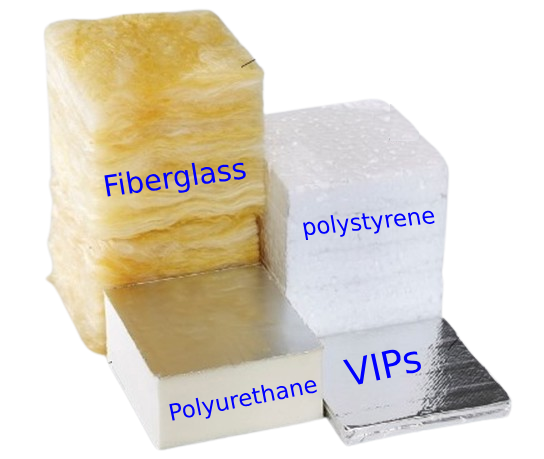What is a Vacuum Insulation Panel (VIP) and how does it work?
How does the thermal performance of Vacuum Insulation Panels compare to traditional insulation materials?
Are Vacuum Insulation Panels suitable for both residential and commercial applications?
Can Vacuum Insulation Panels be used in retrofitting existing buildings?
What are the advantages of using Vacuum Insulation Panels over other insulation options?
1 Answer
What is a Vacuum Insulation Panel (VIP) and how does it work?
A Vacuum Insulation Panel (VIP) is a type of insulation material used to minimize heat transfer. It consists of a core material, such as fiberglass or silica, enclosed in an airtight barrier. The core material is evacuated of air, creating a vacuum inside the panel.
The principle behind VIPs is that a vacuum is a poor conductor of heat, as there are no air molecules to transfer heat energy. This allows VIPs to provide excellent insulation properties with a thin profile. The airtight barrier prevents air from entering the panel and compromising its insulating performance.
VIPs are commonly used in various applications, such as building construction, refrigeration, and transportation, where space is limited, but high insulation efficiency is required.- How does the thermal performance of Vacuum Insulation Panels compare to traditional insulation materials?
Insulation Efficiency: VIPs have an extremely low thermal conductivity, typically ranging from 0.004 to 0.007 W/m·K. This is significantly lower than conventional insulation materials like fiberglass or foam, which typically have thermal conductivities in the range of 0.03 to 0.04 W/m·K. The lower the thermal conductivity, the better the insulation performance.
Thickness: VIPs provide excellent insulation performance even with a much thinner profile compared to traditional insulation materials. They can achieve the same level of insulation as thicker layers of conventional insulation, allowing for space-saving benefits.
Moisture Resistance: VIPs are highly resistant to moisture ingress due to their airtight barrier. This prevents moisture from penetrating the panel and compromising its insulation properties. Traditional insulation materials, on the other hand, may absorb moisture, reducing their effectiveness over time.
Longevity: VIPs have a long service life and maintain their insulation performance over time. They are not prone to settling or degradation, unlike some traditional insulation materials that may lose their effectiveness over the years.
-
Are Vacuum Insulation Panels suitable for both residential and commercial applications?
-
Can Vacuum Insulation Panels be used in retrofitting existing buildings?
-
What are the advantages of using Vacuum Insulation Panels over other insulation options?
High Thermal Performance: VIPs provide excellent thermal insulation, often outperforming traditional insulation materials. They have a very low thermal conductivity, which means they can effectively reduce heat transfer and improve energy efficiency in buildings.
Thin Profile: VIPs have a thin profile compared to other insulation materials. This makes them ideal for applications where space is limited, such as retrofitting existing buildings or adding insulation to walls, roofs, or floors without significantly increasing their thickness.
Lightweight: VIPs are lightweight, which makes them easier to handle and install compared to bulkier insulation materials. This can save time and effort during the installation process.
Reduced Thickness: Due to their high thermal performance, VIPs can achieve the same insulation value with a thinner layer compared to other materials. This can be advantageous in situations where maintaining or maximizing interior space is important.
Long Lifespan: VIPs are known for their durability and long lifespan. When properly installed and protected, they can maintain their thermal performance for several decades.
Vacuum Insulation Panels (VIPs) offer significantly higher thermal performance compared to traditional insulation materials. Here are a few key points of comparison:
It's important to note that while VIPs offer superior thermal performance, they may be more expensive than traditional insulation materials. The choice of insulation depends on specific project requirements, budget, and space limitations.
Yes, Vacuum Insulation Panels (VIPs) are suitable for both residential and commercial applications. They can be used in various building types, including homes, offices, schools, hospitals, and industrial facilities. VIPs offer excellent thermal insulation performance, making them an ideal choice for energy-efficient construction in both residential and commercial settings.
In residential applications, VIPs can be used for insulating walls, roofs, floors, and even refrigeration units. They help to maintain comfortable indoor temperatures, reduce energy consumption, and lower heating and cooling costs.
In commercial applications, VIPs are commonly used in the construction of commercial buildings, warehouses, and cold storage facilities. They provide effective insulation for walls, ceilings, and floors, helping to create a thermally efficient environment and minimize energy loss.
By using VIPs in both residential and commercial buildings, it is possible to enhance energy efficiency, reduce carbon footprint, and create more sustainable and comfortable spaces.
Yes, Vacuum Insulation Panels (VIPs) can be used in retrofitting existing buildings. They are a versatile insulation solution that can be applied to various building types, including retrofit projects.
One advantage of VIPs is their thin profile compared to traditional insulation materials. This makes them particularly suitable for retrofitting where space is limited. VIPs can be installed on the interior or exterior of existing walls, roofs, or floors, providing enhanced insulation without significantly altering the building's structure.
In retrofit applications, VIPs can help improve the thermal performance of older buildings, reducing energy consumption and enhancing comfort. They can be especially beneficial in improving the insulation of solid walls, which are typically more challenging to insulate using conventional methods.
Before considering VIPs for a retrofit project, it's important to assess the specific requirements and consult with a professional to ensure proper installation and compatibility with the existing building components.
Vacuum Insulation Panels (VIPs) offer several advantages over other insulation options:
It's important to note that while VIPs offer significant advantages, they may not be suitable for every application. Factors such as cost, moisture resistance, and compatibility with other building materials should be considered when choosing insulation options.